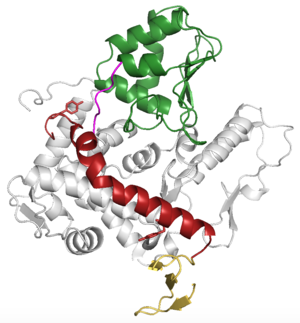We apologize for Proteopedia being slow to respond. For the past two years, a new implementation of Proteopedia has been being built. Soon, it will replace this 18-year old system. All existing content will be moved to the new system at a date that will be announced here.
WWP2
From Proteopedia
(Difference between revisions)
| Line 2: | Line 2: | ||
==Introduction== | ==Introduction== | ||
| - | WWP2 is a type of [[ubiquitin protein ligase]]. More specifically, it is a member of the | + | WWP2 is a type of [[ubiquitin protein ligase]]. More specifically, it is a member of the '''H'''omologous to the '''E'''6-AP '''C'''arboxyl '''T'''erminus (HECT) E3 Ligases family which accept a ubiquitin molecule from an enzyme upstream in the ubiquitination pathway and transfer the ubiquitin to a target signaling molecule or transcription factor. The thioester bond formation between an active site Cystine on HECT E3 Ligases and ubiquitin differentiates this family of enzymes from the more abundant RING family of ubiquitin ligases which do not covalently bond to the ubiquitin ligand. |
| - | + | ||
==Structure== | ==Structure== | ||
Revision as of 19:49, 15 June 2020
Contents |
Introduction
WWP2 is a type of ubiquitin protein ligase. More specifically, it is a member of the Homologous to the E6-AP Carboxyl Terminus (HECT) E3 Ligases family which accept a ubiquitin molecule from an enzyme upstream in the ubiquitination pathway and transfer the ubiquitin to a target signaling molecule or transcription factor. The thioester bond formation between an active site Cystine on HECT E3 Ligases and ubiquitin differentiates this family of enzymes from the more abundant RING family of ubiquitin ligases which do not covalently bond to the ubiquitin ligand.
Structure
| |||||||||||
Function
Disease
Relevance
Structural highlights
References
Proteopedia Page Contributors and Editors (what is this?)
Tihitina Y Aytenfisu, Hannah Campbell, Sandra B. Gabelli, Michal Harel

